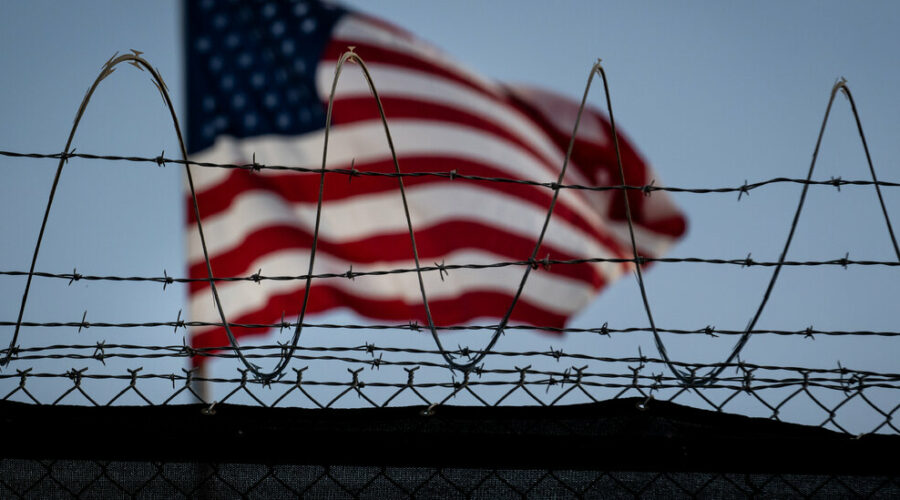U.S. Military Repatriates Saudi Engineer Who From Guantánamo Bay
The U.S. military on Wednesday repatriated a U.S.-educated Saudi engineer who had been held for more than 20 years at Guantánamo Bay under suspicion of having made bombs for Al Qaeda, but was never brought to trial.
The transfer of the detainee, Ghassan Abdullah al-Sharbi, 48, was authorized in September by Defense Secretary Lloyd J. Austin III after months of diplomatic efforts by the Biden administration but was then delayed for reasons U.S. officials declined to explain.
The repatriation reduced the detainee population at the U.S. military prison in Cuba to 31 men, 17 of whom are approved for resettlement or repatriation after security agreements are reached with countries willing to take them in.
Mr. al-Sharbi was of particular interest to the United States after the attacks of Sept. 11, 2001, because he had taken flight school courses in Phoenix with two of the hijackers. He had lived in Europe and the United States, where he attended Embry-Riddle Aeronautical University in Arizona and was fluent in English.
He was approved for release in February last year by the Periodic Review Board, an interagency panel with representatives from the Pentagon, the intelligence agencies and cabinet agencies. The board recommended that Mr. al-Sharbi be sent to a nation that would provide him with care for “physical and mental health issues,” restrict his travel, monitor his activities and share information about him with U.S. authorities.
The Secretive World of Guantánamo Bay
The Pentagon said in a statement announcing the transfer that the United States appreciates the assistance of Saudi Arabia and other countries in “responsibly reducing the detainee population and ultimately closing the Guantanamo Bay facility.”
Mr. al-Sharbi’s transfer is the fourth recent release from the Guantánamo prison, following the repatriation of two Pakistani brothers on Feb. 23 and the resettlement of another man in Belize in early February.
Military prosecutors tried to put Mr. al-Sharbi on trial in the early 2000s as part of a team that was captured in Pakistan while allegedly making explosive devices to target U.S. soldiers in Afghanistan.
He was charged with “providing material support for terrorism.” But higher courts ruled that the charge of providing material support was not a recognized international war crime at the time of his actions, so the case was dropped. He spent years under indefinite detention.
A transcript from a status hearing in 2004 or 2005 portrayed him as a belligerent, unrepentant prisoner. “I did not come here to defend myself, but defend the Islamic nation,” he told the board in a brief monologue that railed against capitalism, homosexuality, U.S. support for Israel and the war in Iraq.
In the years that followed, he refused the efforts of civilian lawyers to seek his release through a habeas corpus petition in federal court, telling a civilian judge in 2009 that “the American U.S. legal system is just the lavatory that flushes the dirty output of Uncle Sam — you’re just trying to wipe out whatever he does, negative things.”
Until 2020, he refused to cooperate with the review boards that sought to determine whether a detainee was too dangerous for release. Then in letters from his prison cell to a federal court in Washington, D.C., including one dated Sept. 11, 2020, he asked for a pro bono, court-appointed lawyer to help him seek release.
In December 2021, a military officer, acting as his representative, told the board that Mr. al-Sharbi “was comfortable around those of different backgrounds and faith” and should be released to an Arabic- or English-speaking country.
Mr. al-Sharbi aspired to work but “recognized he may need some additional training as the engineering world has continued to evolve during his detention,” his representative said. Alternatively, he added, Mr. al-Sharbi could become a “teacher or tutor” because he had a minor in mathematics from Embry-Riddle.
Mr. al-Sharbi was expected to ultimately go to Saudi Arabia’s rehabilitation center for Muslim extremists, which last received a Guantánamo detainee toward the end of the Obama administration. Two Saudi citizens were repatriated by the Trump and Biden administrations. But one was sent to complete a prison sentence, and the other was transferred to a mental health care facility as a torture survivor.
More than 100 Saudi citizens were released during the George W. Bush administration. The Saudi government sent commercial airliners to Guantánamo to pick them up, which permitted rehabilitation efforts to begin on the base airstrip as soon as U.S. guards unshackled the prisoners.
In recent years, however, the United States delivered Saudi prisoners to the kingdom in military missions that relied on stringent Guantánamo transfer protocols. Detainees were bound with shackles, and forced to wear blackout goggles and noise reduction ear protection — security measures similar to those used when the men were brought to Guantánamo Bay.
Source: Read Full Article

